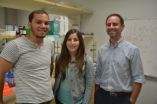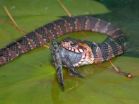(Press-News.org) ARLINGTON HEIGHTS, Ill. (June 26, 2014) – It's tough being the parent of a child with food allergies. Constant vigilance is needed for everything your child eats, when a single food item containing a hidden ingredient can be fatal. Although worry is a factor for anyone caring for a child with food allergies, according to a study published in the July issue of Annals of Allergy, Asthma and Immunology, the scientific publication of the American College of Allergy, Asthma and Immunology (ACAAI), there is increased anxiety and strain for caregivers of children allergic to milk and eggs.
The study examined 305 caregivers of children allergic to milk, egg, peanut or tree nut – the 4 most common food allergies. The caregivers were asked about details of the children's most severe food reaction, as well as information about the caregiver's quality of life. Researchers found caregivers who understood their child's reaction to offending foods had a higher quality of life. If they knew exactly what foods could give their child an allergic reaction, they were less likely to be anxious and stressed.
The authors were surprised to learn that milk and egg allergies were the most worrisome for caregivers.
"It's assumed peanut and tree allergies are the most severe, and therefore it may be presumed they would cause the most strain for caregivers" said allergist Laura Howe, MD, lead study author and ACAAI member. "But because eggs and milk are everywhere, and used to prepare so many dishes, caregivers with children allergic to those two ingredients feel more worried and anxious."
Only 64 percent of caregivers accurately perceived the severity of their child's reaction. More than 15 percent over-perceived their child's reaction severity and 19 percent under-perceived the reaction severity. Caregivers had significant concerns regarding their ability to help in the event of a reaction, and also that others wouldn't understand the seriousness of their child's food allergy.
"It is important for those who care for food-allergic children to work with an allergist to determine exactly what foods their child is allergic to, and how to respond in an emergency situation," said allergist Michael Foggs, MD, ACAAI president. "Parents need to have a clear plan of action in case their child eats a food they shouldn't. Children with a history of severe allergic reactions, and their caregivers, need to know how to administer epinephrine. Having plans in place can ease a parent's worries."INFORMATION:
For more information about food allergies, visit AllergyAndAsthmaRelief.org.
About ACAAI
The ACAAI is a professional medical organization of more than 6,000 allergists-immunologists and allied health professionals, headquartered in Arlington Heights, Ill. The College fosters a culture of collaboration and congeniality in which its members work together and with others toward the common goals of patient care, education, advocacy and research. ACAAI allergists are board-certified physicians trained to diagnose allergies and asthma, administer immunotherapy, and provide patients with the best treatment outcomes. For more information and to find relief, visit http://www.AllergyandAsthmaRelief.org. Join us on Facebook, Pinterest and Twitter.
Peanuts don't panic parents as much as milk and eggs
Study shows caregivers' allergy perceptions not always accurate
2014-06-26
ELSE PRESS RELEASES FROM THIS DATE:
To avoid interbreeding, monkeys have undergone evolution in facial appearance
2014-06-26
Old World monkeys have undergone a remarkable evolution in facial appearance as a way of avoiding interbreeding with closely related and geographically proximate species, researchers from New York University and the University of Exeter have found. Their research provides the best evidence to date for the role of visual cues as a barrier to breeding across species.
"Evolution produces adaptations that help animals thrive in a particular environment, and over time these adaptations lead to the evolution of new species," explains James Higham, an assistant professor in ...
A breakthrough for organic reactions in water
2014-06-26
Green-chemistry researchers at McGill University have discovered a way to use water as a solvent in one of the reactions most widely used to synthesize chemical products and pharmaceuticals.
The findings, published June 26 in Nature Communications, mark a potential milestone in efforts to develop organic reactions in water.
Chao-Jun Li and Feng Zhou of McGill's Department of Chemistry report that they have discovered a catalytic system which for the first time allows direct metal-mediated reactions between aryl halides and carbonyl compounds in water.
For the past ...
Research says TB infection may be underestimated among people taking corticosteroid pills
2014-06-26
TORONTO, June 26, 2014—Tuberculosis infection among people taking corticosteroid pills may be underestimated, new research suggests. Current guidelines for what constitutes a positive TB skin test among corticosteroid pill users may not be capturing all those who are infected, said Dr. Nicholas Vozoris, a respirologist in the Tuberculosis Program at St. Michael's Hospital.
Previous research has shown that people who take corticosteroid pills, such as Prednisone, and have inhaled the TB bacteria, have an eight times higher risk of the bacteria becoming active than people ...
Men and women use mental health services differently
2014-06-26
TORONTO, June 26, 2014 – Women with chronic physical illnesses are more likely to use mental health services than men with similar illnesses; they also seek out mental health services six months earlier than those same men, according to new study from St. Michael's Hospital and the Institute for Clinical Evaluative Sciences (ICES).
"Chronic physical illness can lead to depression," said Dr. Flora Matheson, a scientist in the hospital's Centre for Research on Inner City Health. "We want to better understand who will seek mental health services when diagnosed with a chronic ...
Continued use of low-dose aspirin may lower pancreatic cancer risk
2014-06-26
PHILADELPHIA — The longer a person took low-dose aspirin, the lower his or her risk for developing pancreatic cancer, according to a study published in Cancer Epidemiology, Biomarkers & Prevention, a journal of the American Association for Cancer Research.
"We found that the use of low-dose aspirin was associated with cutting the risk of pancreatic cancer in half, with some evidence that the longer low-dose aspirin was used, the lower the risk," said Harvey A. Risch, MD, PhD, professor of epidemiology in the Department of Chronic Disease Epidemiology at the Yale School ...
Revisions needed for current IV feeding safeguards against bloodstream infections
2014-06-26
Current guidelines to help prevent bloodstream infections during intravenous feeding may need
revisions to strengthen protections for patients, a new study finds.
Researchers at the United Kingdom's University of Southampton found that current guidelines do not account for other independent factors that can affect the growth of potentially deadly microorganisms. Their study was published today in the OnlineFirst version of the Journal of
Parenteral and Enteral Nutrition (JPEN), the research journal of the American Society for Parenteral and Enteral Nutrition (A.S.P.E.N.). ...
Researchers call for patients who receive home nutritional care to have emergency plans
2014-06-26
On the heels of the 2014 hurricane season, researchers are calling for home parenteral and enteral nutrition (HPEN) consumers and their homecare providers to have a comprehensive emergency preparedness plan (EPP) to ensure that special needs are met during the time of a disaster.
In a paper published today in the American Society for Parenteral and Enteral Nutrition's (A.S.P.E.N.) Nutrition in Clinical Practice journal, researchers with Coram Specialty Infusion Services outline the experiences of HPEN consumers and homecare providers in New Jersey affected by Hurricane ...
Researchers discover 'Trojan Horse' method of penetrating cellular walls without harm
2014-06-26
COLLEGE STATION – Scientists with Texas A&M AgriLife Research have found a "Trojan horse" way to deliver proteins into live human cells without damaging them.
The finding, published in this month's Nature Methods, is expected to be easily adopted for use in medical research to find cures and treatments for a wide range of diseases, according to the team's lead scientist, Dr. Jean-Philippe Pellois, an associate professor of biochemistry at Texas A&M University.
"This is something that for many years people have tried to do, because proteins are basic components of the ...
Invasive watersnakes introduced to California may pose risk to native species
2014-06-26
Watersnakes, commonly seen in the lakes, rivers and streams of the eastern United States, are invading California waterways and may pose a threat to native and endangered species in the state, according to a University of California, Davis, study.
While scientists do not know exactly how many watersnakes are in California, roughly 300 individuals of two different species –the common watersnake and the southern watersnake -- have been found in the Sacramento area (Roseville and Folsom), and at least 150 were seen in Long Beach. Researchers suspect the nonvenomous snakes ...
Sequencing efforts miss DNA crucial to bacteria's disease causing power
2014-06-26
Genomic sequencing is supposed to reveal the entire genetic makeup of an organism. For infectious disease specialists, the technology can be used to analyze a disease-causing bacterium to determine how much harm it is capable of causing and whether or not it will be resistant to antibiotics. But new research at Rockefeller University suggests that current sequencing protocols overlook crucial bits of information: isolated pieces of DNA floating outside the bacterial chromosome, the core of a cell's genetic material.
"Extensive sequencing of chromosomal DNA has been performed ...
LAST 30 PRESS RELEASES:
Justice after trauma? Race, red tape keep sexual assault victims from compensation
Columbia researchers awarded ARPA-H funding to speed diagnosis of lymphatic disorders
James R. Downing, MD, to step down as president and CEO of St. Jude Children’s Research Hospital in late 2026
A remote-controlled CAR-T for safer immunotherapy
UT College of Veterinary Medicine dean elected Fellow of the American Academy of Microbiology
AERA selects 34 exemplary scholars as 2026 Fellows
Similar kinases play distinct roles in the brain
New research takes first step toward advance warnings of space weather
Scientists unlock a massive new ‘color palette’ for biomedical research by synthesizing non-natural amino acids
Brain cells drive endurance gains after exercise
Same-day hospital discharge is safe in selected patients after TAVI
Why do people living at high altitudes have better glucose control? The answer was in plain sight
Red blood cells soak up sugar at high altitude, protecting against diabetes
A new electrolyte points to stronger, safer batteries
Environment: Atmospheric pollution directly linked to rocket re-entry
Targeted radiation therapy improves quality of life outcomes for patients with multiple brain metastases
Cardiovascular events in women with prior cervical high-grade squamous intraepithelial lesion
Transplantation and employment earnings in kidney transplant recipients
Brain organoids can be trained to solve a goal-directed task
Treatment can protect extremely premature babies from lung disease
Roberto Morandotti wins prestigious Max Born Award for pioneering research in quantum photonics
Scientists map brain's blood pressure control center
Acute coronary events registry provides insights into sex-specific differences
Bar-Ilan University and NVIDIA researchers improve AI’s ability to understand spatial instructions
New single-cell transcriptomic clock reveals intrinsic and systemic T cell aging in COVID-19 and HIV
Smaller fish and changing food webs – even where species numbers stay the same
Missed opportunity to protect pregnant women and newborns: Study shows low vaccination rates among expectant mothers in Norway against COVID-19 and influenza
Emotional memory region of aged brain is sensitive to processed foods
Neighborhood factors may lead to increased COPD-related emergency department visits, hospitalizations
Food insecurity impacts employees’ productivity
[Press-News.org] Peanuts don't panic parents as much as milk and eggsStudy shows caregivers' allergy perceptions not always accurate


